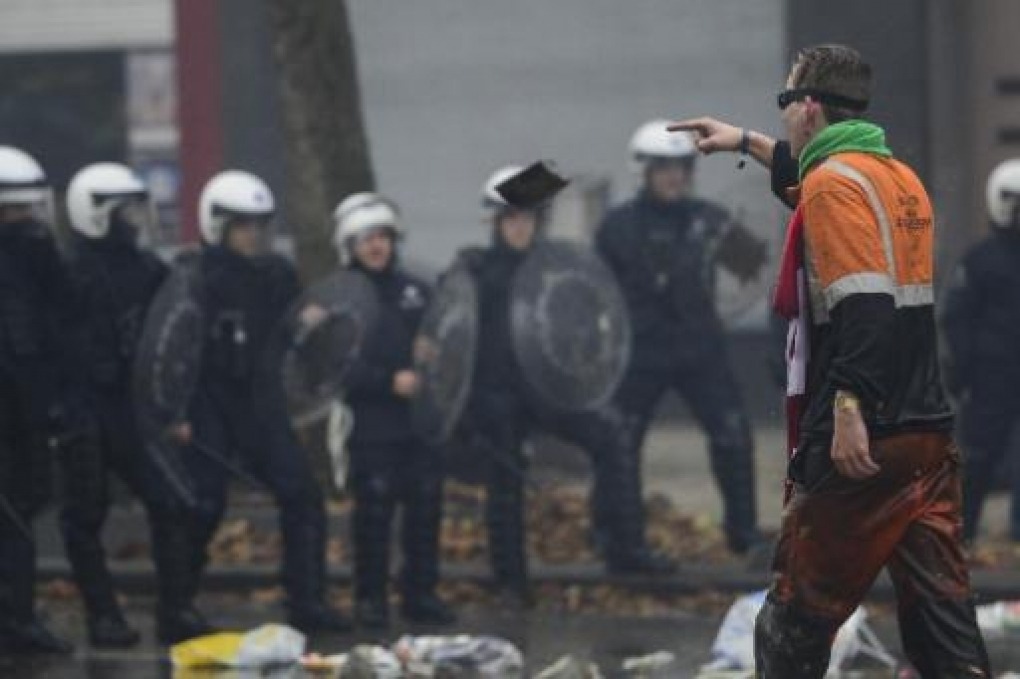Brussels life is periodically punctuated by strikes against budget cuts and jobs losses. But such protests pale in comparison to the political backlash against austerity that is gathering strength across much of the eurozone. Patronisingly dismissed as “populist” by the often-unelected eurozone establishment, anti-austerity parties of various stripes are certainly increasingly popular. They did exceptionally well in last year’s European Parliament elections – and now the insurgents are storming the barricades of national governments.
It’s not surprising that voters are fed up with the seemingly endless misery. A lost decade is not a risk for the eurozone: it is a reality. Eight years into the crisis, the economy is stagnating and remains 2% smaller than in early 2008. Many have suffered big wage cuts, not least the 18 million unemployed. The jobless rate is 11.5% – and much higher in southern Europe, especially among young people. Many households are struggling to pay their debts – and with prices now falling, deflation is set to make that even harder.
Greece has suffered most. The economy has shrunk by more than a quarter. Incomes have collapsed by nearly a third; many workers go unpaid. One in four Greeks – and three in five young people – are unemployed. The social safety net has been shredded. Many families scrape by on seniors’ slashed pensions. Crowds jostle for handouts at food banks. Some children are reduced to scavenging through rubbish bins for scraps. Hospitals run short of medicines. Malaria has even made a return.
After five years of Diktat by the Troika – made up of the European Commission, the European Central Bank (ECB) and the International Monetary Fund (IMF) – Greeks have had enough. On 25 January they elected a radical-left Syriza-led government that pledges to end austerity and renegotiate the terms of Greece’s €205 billion loans from eurozone governments. That sets up a showdown with eurozone authorities – not least the creditor-in-chief, Angela Merkel’s government in Berlin – that might even lead to Greece’s ejection from the euro, with unpredictable repercussions.
Greece is in the vanguard of a much wider revolt. Now that voters are no longer terrified by the financial panic, they are venting their fury at establishment parties and EU technocrats who have conspicuously failed to resolve the crisis and whom they no longer trust to have their best interests at heart.
Can you blame them? After all, rich bankers and their creditors have been bailed out with taxpayers’ money, while poor schoolchildren and other essential services have suffered budget cuts. Nobody at the European Commission has lost their job or even suffered a wage cut for imposing premature, excessive, across-the-board austerity, which unnecessarily cost 10% (!) of eurozone GDP, according to a study by a Commission official using its own economic model. Whenever voters throw out a government, as they have done at nearly every election throughout the crisis, officials from Berlin, Brussels and Frankfurt – whom they did not elect and cannot hold to account – loudly insist that the incoming government must stick to the failed policies of the outgoing one. Since voting for establishment parties of the centre-left or centre-right makes little difference, it’s hardly surprising that voters are seeking a genuine alternative – and regrettably for the moment this only exists on the extremes.
Sometimes the insurgents are on the radical left. In Spain, which is due to hold elections before the end of the year, Podemos, a new party that resembles Syriza, has a narrow lead in the polls. So, in Ireland, does Sinn Fein, a left-wing party that was formerly the political wing of the Irish Republican Army. In other cases, the upstarts are on the far-right. In France, Marine Le Pen’s racist Front National is out in front. In Italy, where reformist prime minister Matteo Renzi remains popular, all three main opposition parties – the far-right Northern League, the anti-establishment Five Star Movement and Silvio Berlusconi’s Forza Italia – are now anti-euro.
Much of what the radical left proposes would be harmful, while Le Pen’s xenophobic nationalism is loathsome. But the likes of Syriza are also right about important things. At a time when households, companies and banks are all trying to reduce their debts at once, austerity leads to stagnation and suffering, not “stability”. Budget cuts and tax rises have often fallen on the poor and vulnerable, not the politically connected rich. The political class in many countries is corrupt and in the pockets of vested interests, not least the banks.
More broadly, it is neither feasible nor fair for debtors to bear the full costs of the financial crisis. For every reckless borrower there is a reckless lender – primarily German and French banks, which lent vast sums to southern Europe, both directly and via local banks. While the EU bailouts of Greece, Ireland, Portugal and Spain are portrayed as gestures of EU solidarity, they were in fact covert bailouts of those foreign banks, which would otherwise have suffered huge losses on their reckless lending to southern Europe. That huge debt burden, which is stifling the economy, is unpayable in full. It should be written down, as Germany’s debts were in 1953.
Nor is it politically sustainable for the eurozone, in effect, to be run by a government in Berlin that acts in its selfish interests as a creditor rather than in the interests of the eurozone as a whole. If countries are to share to currency, they must do so as equals, with EU institutions representing the common interest, rather than acting as instruments for creditors to impose their will on debtors. Denying people basic democratic choices over how much governments can tax and spend is bound to lead to a backlash – especially when EU fiscal rules are economically harmful too. “No taxation without representation” is the stuff of revolutions.
None of this is radical or extreme, let alone “anti-European”. Outside the eurozone, many sensible people of all stripes would agree with it. The tragedy of the eurozone is that the policy establishment in Brussels and national elites are destroying political support for the European project by advancing Germany’s selfish and destructive agenda as a creditor. Thus while Syriza’s victory risks turmoil and may end in tears, the debt conference they are demanding is a necessary step towards a fairer and more sustainable eurozone.


